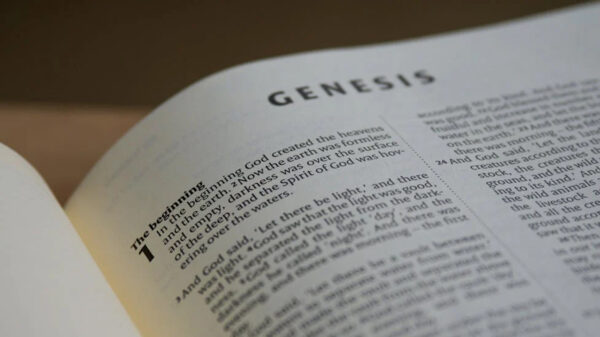
He Made Statements About His “Place” of Origin
When asked about His place of origin, Jesus repeatedly identified it as the same “place” where God the Father abides. While mere humans are described to come from this temporal world, Jesus said He and God the Father came from another Kingdom entirely. When addressing the Jewish leadership, Jesus said:
But he continued, “You are from below; I am from above. You are of this world; I am not of this world. I told you that you would die in your sins; if you do not believe that I am [the one I claim to be], you will indeed die in your sins.” (John 8:23-24)
Later, when addressing Pontius Pilate’s questions about Jesus’ position as the “King’ of the Jews, Jesus said:
Jesus said, “My kingdom is not of this world. If it were, my servants would fight to prevent my arrest by the Jews. But now my kingdom is from another place.” “You are a king, then!” said Pilate. Jesus answered, “You are right in saying I am a king. In fact, for this reason I was born, and for this I came into the world, to testify to the truth. Everyone on the side of truth listens to me.” (John 18:36-37)
Jesus repeatedly told His listeners that He was not of human origin and that He and God the Father came from the same spiritual Kingdom.
He Made Statements About His Position
In addition to all of this, Jesus said many things that were nonsensical unless Jesus considered Himself to be equal to God and of one essence with God. In Matthew 13:41, for example, Jesus said that both the angels and the kingdom were His:
“The Son of man will send His angels, and they will gather out of His kingdom all causes of sin and evildoers” (Matthew 13:41)
In other places in the Gospels, the “angels of God” and the “Kingdom of God” were described as belonging to God the Father, not Jesus:
“I tell you, whoever acknowledges me before men, the Son of Man will also acknowledge him before the angels of God. But he who disowns me before men will be disowned before the angels of God.” (Luke 12:8-9)
To claim that God’s angels were, in fact, His angels would be highly inappropriate unless Jesus and God are one in the same. Jesus also made a number of comments about His relationship with God the Father that would be difficult to understand if Jesus did not consider Himself equal in essence with God:
Jesus answered, “I am the way and the truth and the life. No one comes to the Father except through me. If you really knew me, you would know my Father as well. From now on, you do know him and have seen him.” Philip said, “Lord, show us the Father and that will be enough for us.” Jesus answered: “Don’t you know me, Philip, even after I have been among you such a long time? Anyone who has seen me has seen the Father. (John 14:6-9)
“If a man loves me, he will keep my word, and my Father will love him, and we will come to him and make our home with him” (John 14:23)
These statements make sense if we hear them in the way that Jesus intended them to be heard. He appeared to be saying He and the Father are one, and this is confirmed by other statements as well.
He Made Statements About His Parity
Speaking again to non-believers, Jesus made the argument that His miracles alone should have been enough to demonstrate His Deity. These miracles were proof that He was, in fact, God:
Jesus answered, “I did tell you, but you do not believe. The miracles I do in my Father’s name speak for me, but you do not believe because you are not my sheep. My sheep listen to my voice; I know them, and they follow me. I give them eternal life, and they shall never perish; no one can snatch them out of my hand. My Father, who has given them to me, is greater than all; no one can snatch them out of my Father’s hand. I and the Father are one.” (John 10:25-29)
The Jewish leaders knew what Jesus said here; they knew that Jesus claimed equality with God. That’s why they sought to stone Him for blasphemy:
Again the Jews picked up stones to stone him, but Jesus said to them, “I have shown you many great miracles from the Father. For which of these do you stone me?” “We are not stoning you for any of these,” replied the Jews, “but for blasphemy, because you, a mere man, claim to be God.” (John 10:31-33)
Even if you’re inclined to deny that Jesus ever directly said He was God, I think it’s unreasonable to argue against this indirect, circumstantial case. When all of Jesus’ statements are considered together, the case is clear; His words, in total, demonstrate that Jesus did, in fact, believe that He was God. Even if you’re inclined to deny that Jesus ever directly said He was God, I think it’s unreasonable to argue against this indirect, circumstantial case. Share on X

J. Warner Wallace is a Dateline featured Cold-Case Detective, Senior Fellow at the Colson Center for Christian Worldview, Adj. Professor of Christian Apologetics at Talbot School of Theology, Biola University, author of Cold-Case Christianity, God’s Crime Scene, and Forensic Faith, and creator of the Case Makers Academy for kids.
Subscribe to J. Warner’s Daily Email
J. Warner Wallace is a Dateline featured cold-case homicide detective, popular national speaker and best-selling author. He continues to consult on cold-case investigations while serving as a Senior Fellow at the Colson Center for Christian Worldview. He is also an Adj. Professor of Christian Apologetics at Talbot School of Theology, Biola University, and a faculty member at Summit Ministries. He holds a BA in Design (from CSULB), an MA in Architecture (from UCLA), and an MA in Theological Studies (from Gateway Seminary).







































Pingback: Coled case | Prestigepartyp
Pingback: The Case for the Historicity and Deity of Jesus | Cold Case Christianity
Pingback: The Case for the Historicity and Deity of Jesus | A disciple's study
Pingback: Reasonable Faith, Biblical Interpretation and “Tipping Point” Evidence | Cold Case Christianity
Pingback: Midweek Apologetics Roundup |
Pingback: The Circumstantial Statements of Jesus’ Divinity | A disciple's study
Pingback: The Circumstantial Statements of Jesus’ Divinity | TLG Christian News
Pingback: Midweek Apologetics Roundup - Stephen J. Bedard
Pingback: Weekly Apologetics Bonus Links 10/28-11/3 | Apologetics315